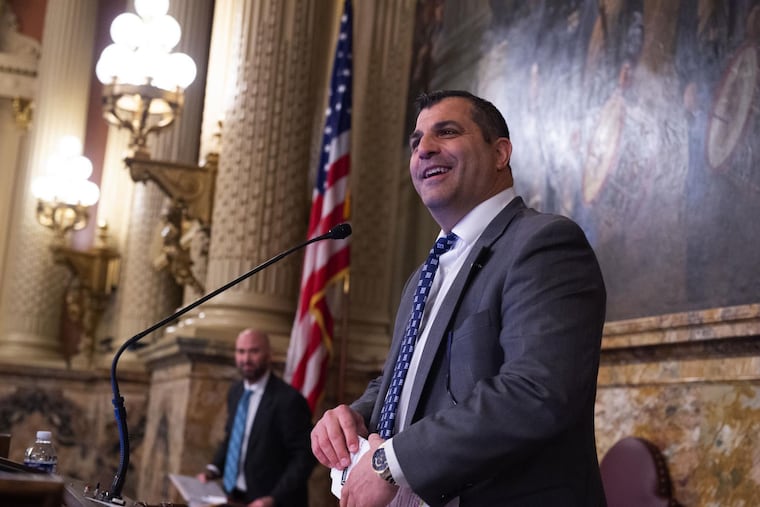Will Mark Rozzi register independent? Will he serve a full term? Questions remain after last week’s Pa. House speaker election.
Unanswered questions remain about how the House will function after Speaker Mark Rozzi's selection, and they will have implications for policy-making and Gov.-elect Josh Shapiro’s agenda.

The Pennsylvania House elected a new speaker last week during a drama-filled session that ended with the ascension of Berks County Democrat Mark Rozzi.
Rozzi’s election — by all Democrats and 16 Republicans — was heralded by some of his supporters as a sign that a chamber narrowly divided along partisan lines could still govern by consensus.
But almost a week after the leadership vote, there are still unanswered questions about how the House will function — all of which will have implications for policy-making and Gov.-elect Josh Shapiro’s agenda.
» READ MORE: The Pa. House speaker election is upending Harrisburg. ‘All hell broke loose.’
Will Rozzi remain a registered Democrat or change his party identification to independent?
Heading into last week’s speaker vote, Republicans held a narrow majority in the House, with 101 seats to Democrats’ 99. Despite that narrow edge, no single Republican was able to win enough support among the GOP caucus to become speaker.
House Republican leaders decided to offer their support to Rozzi — seen as a relatively moderate Democrat — if he agreed to meet certain conditions, including that he change his party registration to independent.
Rozzi said during a speech last week that he would be Pennsylvania’s first “independent speaker,” pledging not to caucus with either party. But he later told House Democrats in a private meeting that he would remain a registered Democrat, The Inquirer has previously reported. Rozzi has not clarified his position.
» READ MORE: What new Pa. House Speaker Mark Rozzi’s voting record tells us about how independent he is
The issue may seem like a matter of semantics, but Rozzi’s decision could end up affecting his relationship with both parties and potentially hamper legislative deal-making. If he remains a Democrat, Republicans might think he broke his promise. And if he does leave the Democratic Party, his longtime colleagues may feel betrayed.
The Republican who nominated Rozzi for speaker is already having buyer’s remorse, according to reporting from Spotlight PA and the Associated Press. Rep. Jim Gregory (R., Blair) asked Rozzi to resign in a letter Monday. Gregory cited a discussion the two had Saturday in which he said Rozzi told him he was “only thinking about switching” his party registration.
The two worked together on child sex-abuse legislation, but Gregory wrote, “bonds of trust between friends — as close as you and I have been — are now broken,” the AP reported.
Gregory confirmed the letter to the AP in a brief interview Monday.
As a practical matter, an independent Rozzi would mean that even if Democrats win three special elections, as expected, to fill the House vacancies, they’d fall short of an outright majority. The chamber would be divided 101-101-1.
Will Rozzi serve a full two-year term as speaker?
House Republican leader Bryan Cutler (R., Lancaster) has said he expects Rozzi to be speaker for the entirety of the 2023-24 legislative session. Democratic leaders have stayed quiet on that question.
Democrats won 102 seats in the November elections — enough for a slight majority in the 203-seat House. Democratic lawmakers had hoped that their new majority would make House Democratic leader Joanna McClinton the first woman and second Black person to be speaker.
But three vacancies — one lawmaker died, and two more were elected to higher office — left the party in the minority. Democrats are favored to win the special elections to fill the seats, which would theoretically bring the party to 102 seats and the majority ― as long as Rozzi remains a Democrat.
Rozzi could agree to step down as speaker following the special elections in order to elevate McClinton. Or he might oppose such an effort.
What will the House rules say?
The House can’t take up legislation or do much of anything else until it passes rules that will determine the partisan makeup of committees and other important procedural matters. The rules will help decide what happens if neither party has an outright majority, for example, and whether and how a speaker can be recalled.
It’s unclear how long it might take lawmakers to enact the rules. The legislature convened Monday after outgoing Gov. Tom Wolf ordered a special session to consider a constitutional amendment that would create a window for survivors of childhood sexual abuse to file civil suits. During a special session, lawmakers can only consider the legislation before it.
Amid an hourslong delay of the session Monday, Cutler suggested he was frustrated with Rozzi’s leadership. The House GOP leader told reporters Monday evening that his caucus had the votes to pass new rules.
“I really think we should focus on getting to work. And if we can’t do that, or if [Rozzi] does not believe he’s capable of doing that, then perhaps he should consider stepping aside, as Rep. Gregory has indicated,” Cutler said.
In a statement Monday, Rozzi blamed the divide between Republicans and Democrats for thwarting his efforts to pass the constitutional amendment.
“This sort of partisan divide is what has plagued Pennsylvanian politics for far too long,” he said.
Staff writers Gillian McGoldrick, Jonathan Lai, and Jason Laughlin contributed to this article.